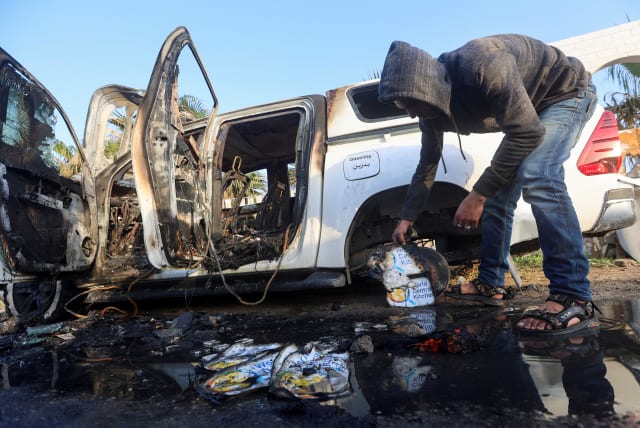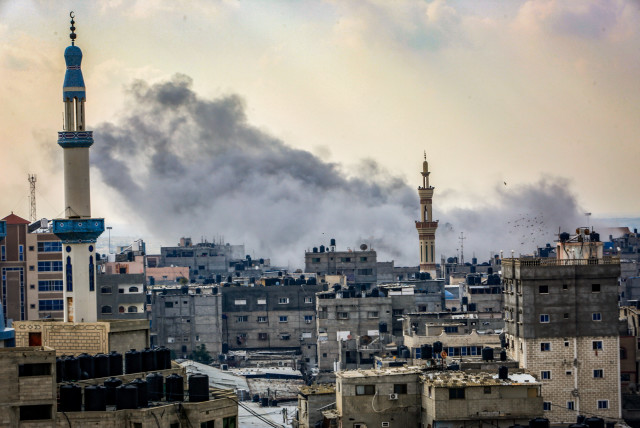To decide not to decide: Kicking the can down the road in Gaza - comment

The IDF needs to ask itself tough questions about breaches of protocol – not after the war, but right now.
There’s an infamous saying in Hebrew: “L’hachlit lo l’hachlit.” Literally, that’s “to decide not to decide,” or in plain English, “to kick the can down the road.”
That saying has been the guide for Israeli policy for decades. Can’t reach an agreement on something? We’ll deal with it later. Does something seem a little controversial? Someone else can deal with it.
At times, this practice may serve petty political purposes, but it can also result in significant loss of life. Last Tuesday, we saw such a tragic instance when seven international World Central Kitchen aid workers were killed in an airstrike.
Sources from the defense establishment who have spoken with Israeli media have all pointed to one major issue that led to the strike on the WCK convoy: soldiers and commanders are not following protocol. They’re not asking for the proper approval; they’re not abiding by the chain of command, or, as Judges 21:25 puts it, “everyone did what was right in their eyes.”
The last big warning sign about this trend was issued in January when Brig.-Gen. Barak Hiram, the commander of the IDF’s 99th Division, decided to blow up a university in Gaza without the proper authorization.
While the IDF was likely to approve the building’s demolition regardless, doing so without approval was a serious breach of the chain of command.
Hiram was reprimanded for the act (essentially, a slap on the wrist), and everyone moved on. Some government members even expressed outrage at the reprimand, insisting that Hiram should be awarded rather than punished for his breach of protocol.
Hiram's protocol breach is the tip of the iceberg
But Hiram’s breach of protocol appears to have been just the tip of the iceberg. Defense establishment sources have told Israeli media that such breaches have become commonplace in the war.
That same issue, a lack of respect for protocol, which in one case led to the demolition of an empty building, was the same issue that led to the killing of seven aid workers from an organization that has staunchly defended Israel’s right to protect itself while putting itself at significant risk in conflict zones.
The question must be asked: If the IDF was aware of this issue, if it had become so widespread that commanders of entire divisions felt comfortable breaching protocol, why was nothing done? Was the General Staff afraid to upset a government that has consistently opposed holding security forces who breach protocol accountable?
Did they feel that something so serious could wait until after the war or that handling a controversial issue like this was just too dangerous of a minefield?
Whatever the reason behind the decision, it was the same: L’hachlit lo l’hachlit. But now, the can has been kicked down the road as far as possible. Any further, and it will fall into the abyss.
Seven innocent aid workers were killed in an incident that, if the protocol had been followed, appears to have been entirely preventable. If, instead of kicking the can down the road, the IDF had cracked down on breaches of protocol and insisted on the importance of the chain of command and clear communication, the actual likelihood is that seven families would not be mourning their loved ones right now.
There is a very real chance that Israel would not be facing one of its most serious crises in international relations.
THE IDF has a code of ethics called “The Spirit of the IDF.” That code includes various ideals, including discipline.The code's preamble states, “IDF soldiers will act according to the values of the IDF and its orders while following the laws of the state and human dignity and respecting the values of the State of Israel as a Jewish and democratic state.”
The code stresses that IDF soldiers “will operate to the best of their ability to fulfill what is required of them in a complete and successful manner and in accordance with the orders they were given and the values of the IDF.”
After the tragic incident on Tuesday and the revelations that this incident was a symptom of the much broader issue of disregard for protocol, the IDF must ask itself if it is meeting the requirements of this sacred code.
Discipline is a central part of a successful military. When that discipline is disrupted, especially on what appears to be a systematic level, it risks harming our moral code and national security.
If soldiers do not follow protocol or establish clear communication with commanders when blowing up buildings or striking vehicles in humanitarian zones, consider what other cases may have been affected by a disregard for protocol.
Is this exact breakdown of protocol harming the war effort? Is intelligence being missed? Are reckless or inappropriate missions being sent out without the proper approval?
These are all questions the IDF must ask itself – not after the war, not somewhere down the road, but right now. The excuse that “it’s the middle of a war” can no longer be used when this issue deeply affects the war effort itself. For the sake of our national security and moral code, they can not be kicked any further down the road.
The writer is a breaking news editor at The Jerusalem Post and is studying political science and Middle Eastern studies at Bar-Ilan University.
Jerusalem Post Store
`; document.getElementById("linkPremium").innerHTML = cont; var divWithLink = document.getElementById("premium-link"); if (divWithLink !== null && divWithLink !== 'undefined') { divWithLink.style.border = "solid 1px #cb0f3e"; divWithLink.style.textAlign = "center"; divWithLink.style.marginBottom = "15px"; divWithLink.style.marginTop = "15px"; divWithLink.style.width = "100%"; divWithLink.style.backgroundColor = "#122952"; divWithLink.style.color = "#ffffff"; divWithLink.style.lineHeight = "1.5"; } } (function (v, i) { });

